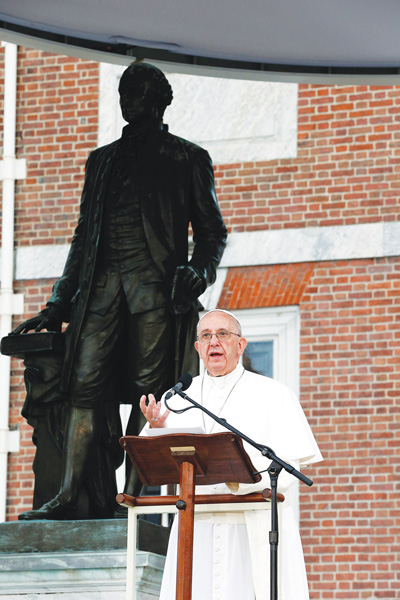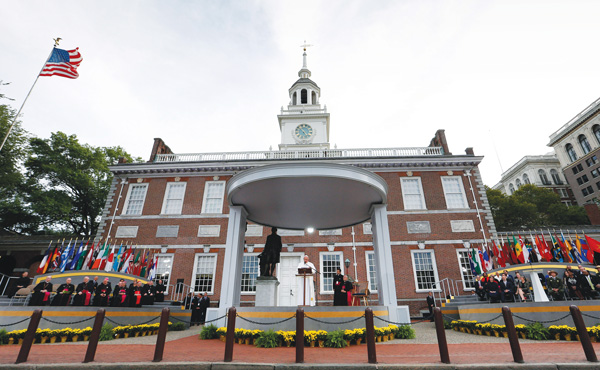By Dennis Sadowski

PHILADELPHIA (CNS) – San Antonio Archbishop Gustavo Garcia-Siller believes Pope Francis’ call for the church to serve immigrants and people on the move around the world will inspire the church to respond with love and care for people seeking a new home.
Waiting for the pope to arrive at Independence Mall for an afternoon address on immigration Sept. 26, Archbishop Garcia-Siller said it will take people working one-on-one with immigrants to help meet the needs of newcomers.
“He is all about going to the peripheries, helping people to mobilize so they can experience what everyone has experienced: happiness, peace and having their needs met,” said Archbishop Garcia-Siller.
“The immigrants, yes, want papers, but above all they want to know that somebody cares for them,” he said. “He is showing us we can love more and love better.”
People throughout the audience on the grassy area in front of Independence Hall expressed hope that the pope will inspire more people, especially policymakers, to react with compassion to the needs of immigrants.
They also said they have been inspired by Pope Francis’ concern for immigrants and that his emphasis on mercy and forgiveness has brought people back to the Catholic Church.
Thomasina Kweku-Kennedy, a member of St. Ignatius Church in Philadelphia, who is involved in archdiocese’s Pastoral Care for Migrants and Refugees program, said those who have returned to her parish in particular often say they have been moved by the pope’s compassion.
“He shares the love that we don’t always experience,” she said.
At the back of ticket seating area, Thomas Sankarathil, a member of St. Jude Syro-Malankara Catholic Church, Philadelphia, and general secretary of the Ecumenical Fellowship of Indian Churches in Philadelphia told CNS that his parish also has seen people returning to the church because of Pope Francis’ outreach to forgotten people.
The pope is “the universal face of the church,” he said.
“This is an opportunity to be sure that family is the fundamental foundation of the living church for the betterment of humanity,” he told CNS. “This is a time the Christian community all over the world is suffering persecution. He is giving us the confidence to be faithful for the benefit of the church.”

As he waited for the pope, Archbishop Alexander K. Sample of Portland, Oregon, was updating his followers on Facebook and Twitter.
“I hope to take back the joy and the enthusiasm the Holy Father has brought to the church here in the United States,” he said. “It’s no secret that western Oregon and the Northwest in general is considered one of the unchurched areas of the United States, and yet in such a secular culture so many people you meet on the street who may have no religious background are just very taken with this pope.
“I think he has opened hearts and I think he has opened minds to the Gospel message and I hope to capitalize on that,” he added.
Theresa Romanowski, a member of St. Adalbert Parish, in the Port Richmond area of Philadelphia, said: “He is a pope of hope. He feels everyone should be loved and treat equally.”
Pope Francis’ speeches at the United Nations and Congress showed his concern for the people of the world who are being persecuted and those who are leaving their homelands to seek security elsewhere. “He’s getting people to do something positive about it,” she added.
Jerkin Lebron said the pope brings hope to all but especially to the unit that needs it most: the family. “He is an especially great hope for Catholic Hispanics,” she said, because he understands especially how immigration affects them.
“We have a challenge in immigration,” she said because it means separation of family members including parents and their children. Her brother, for example, has a son he hasn’t seen in 10 years. “The only contact they have is by phone,” she said, because he is not able to come into the country.
Sometimes people migrate “seeking a better life but that means separation,” said Maria Rodriguez, who was in line waiting to get a glimpse of the pope near Independence Hall. The separation means disintegration of this important unit in society, she said.
When the family is not together, there is no one to guide children or pass down important values, added Rafael Abreu, who said the most basic challenge for a family these days is to accept Christ in an increasingly secular society.
